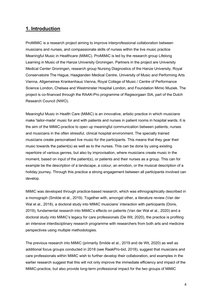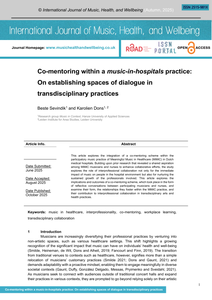To meet the care needs of the rapidly ageing patient populations, the cultivation of a compassionate patient-centred healthcare culture has become central in the value-based healthcare discourse. A participatory music practice, ‘Meaningful Music in Healthcare’ employs a person-centred approach to music-making in Dutch hospitals. A grounded theory analysis on ethnographically collected data suggests that music-making serves as a social change agent and cultural resource for catalysing compassionate contact between healthcare professionals and patients. Processes of experiential growth and shared values in music-making and healthcare help to enrich care relationships and allow the emotional dimension of nurses’ professional performance to be explored.
DOCUMENT
‘Legacy: Participatory Music Practices with Elderly People as a Resource for the Well-being of Healthcare Professionals’ was a qualitative research project into the learning and well-being of hospital nurses and nursing home caregivers working with vulnerable elderly people and participating in live music practices Meaningful Music in Healthcare (MiMiC) and Music and Dementia in the Netherlands.The data collection (2016-2019) employed an ethnographic approach and data triangulation of participant observation, episodic interviews and group discussions. The constructivist grounded theory approach to data analysis proceeded from sensitising concepts to initial and focused coding, ultimately reconstructed into a thick description merging empirical data, theory and the researcher’s interpretations. The emerging core categories, Participation, Experience and Learning Benefits, were conceptualised within an epistemological framework of philosophical pragmatism.The findings suggest that, through an emerging community of practice, healthcare professionals could collaborate with musicians to connect with patients or residents. The collaboration enabled the use of shared musical experiences as a resource for compassionate care. Still, allowing oneself to participate musically and showing emotional vulnerability were challenging. The accumulation of ‘experiencing’ and collegial encouragement supported healthcare professionals’ participation beyond their professional performance.Person-centred music-making resonated with the values of person-centred care. It enabled healthcare professionals to take time and become engaged with patients or residents in musical situations. Healthcare professionals described gaining new understandings of the patients or residents and each other, which could be seen promoting a cultural shift from task-centredness towards relationship-focused person-centred care.Musicians’ communication provided new professional insights into teamwork. Also, observing patients and residents’ responses to the music evoked sympathetic joy in healthcare professionals. Looking through the eyes of ‘the other’ was central for nurses and caregivers’ meaning-making of the value of music-making and awareness of its impact on patients, residents and themselves. The perceived benefits of the music practices for healthcare professionals’ job resources and satisfaction seemed connected to changes in care relationships, work atmosphere, sense of mindfulness and recognition.The conclusions of the research suggest that participatory music practices might be considered as supportive of delivering person-centred care. The findings could be applied in training programmes and professional development of musicians, nurses and caregivers.
DOCUMENT

Music interventions are used for stress reduction in a variety of settings because of the positive effects of music listening on both physiological arousal (e.g., heart rate, blood pressure, and hormonal levels) and psychological stress experiences (e.g., restlessness, anxiety, and nervousness). To summarize the growing body of empirical research, two multilevel meta-analyses of 104 RCTs, containing 327 effect sizes and 9,617 participants, were performed to assess the strength of the effects of music interventions on both physiological and psychological stress-related outcomes, and to test the potential moderators of the intervention effects. Results showed that music interventions had an overall significant effect on stress reduction in both physiological (d = .380) and psychological (d = .545) outcomes. Further, moderator analyses showed that the type of outcome assessment moderated the effects of music interventions on stress-related outcomes. Larger effects were found on heart rate (d = .456), compared to blood pressure (d = .343) and hormone levels (d = .349). Implications for stress-reducing music interventions are discussed.
DOCUMENT

Music interventions are used for stress reduction in a variety of settings because of the positive effects of music listening on both physiological arousal (e.g., heart rate, blood pressure, and hormonal levels) and psychological stress experiences (e.g., restlessness, anxiety, and nervousness). To summarize the growing body of empirical research, two multilevel meta-analyses of 104 RCTs, containing 327 effect sizes and 9,617 participants, were performed to assess the strength of the effects of music interventions on both physiological and psychological stress-related outcomes, and to test the potential moderators of the intervention effects. Results showed that music interventions had an overall significant effect on stress reduction in both physiological (d = .380) and psychological (d = .545) outcomes. Further, moderator analyses showed that the type of outcome assessment moderated the effects of music interventions on stress-related outcomes. Larger effects were found on heart rate (d = .456), compared to blood pressure (d = .343) and hormone levels (d = .349). Implications for stress-reducing music interventions are discussed.
DOCUMENT

This document consists of the research report of Work Package 3 of ProMiMiC's locations Groningen and The Hague. Through the implementation of MiMiC-projects in the form of ‘living labs’, research data was generated leading to insights into (1) concepts of interprofessionality between musicians and healthcare professionals, (2) effects of the MiMiC-practice on nurses’ compassionate skills in contact with patients and (3) the influence of the various contexts on the MiMiC-practice. Given the fact that hospitals are the site of study in ProMiMiC, the research activities of Work Package 3 got highly affected by the COVID-19 pandemic. It led to additional questions and expansion of the MiMiC practice to directions that the consortium hadnot foreseen.--- Update September 2025: Chapter 5 - episodes added as a separate file for open access.
DOCUMENT

There is a need for modernizing the Dutch collective management system of music copyright to match the rapidly changing digital music industry. Focusing on the often-neglected human values aspect, this study, part of a larger PhD research, examines the value preferences of music rights holders: creators and publishers. It aims to advise on technological redesign for music copyright management system and contribute to discussions on equitable collective management. Building upon prior research, which comprehensively analyzed the Dutch music copyright system and identified key stakeholders, this paper analyses 24 interviews with those key stakeholders to identify their values and potential value tensions. Initial findings establish a set of shared values, crucial for the next phases of the study –values operationalization. This research makes a academic contribution by integrating the Value Sensitive Design (VSD) approach with Distributive Justice Theory, enriching VSD's application and enhancing our understanding of the Economics of Collective Management (ECM).
MULTIFILE

Stress is increasingly being recognized as one of the main factors that is negatively affecting our health, and therefore there is a need to regulate daily stress and prevent long-term stress. This need seems particularly important for adults with mild intellectual disabilities (MID) who have been shown to have more difficulties coping with stress than adults without intellectual disabilities. Hence, the development of music therapy interventions for stress reduction, particularly within populations where needs may be greater, is becoming increasingly important. In order to gain more insight into the practice-based knowledge on how music therapists lower stress levels of their patients with MID during music therapy sessions, we conducted focus group interviews with music therapists working with adults with MID (N = 13) from different countries and clinical institutions in Europe. Results provide an overview of the most-used interventions for stress reduction within and outside of music. Data-analysis resulted in the further specification of therapeutic goals, intervention techniques, the use of musical instruments, and related therapeutic change factors. The main findings indicate that music therapists used little to no receptive (e.g., music listening) interventions for stress reduction, but preferred to use active interventions, which were mainly based on musical improvisation. Results show that three therapy goals for stress relief could be distinguished. The goal of “synchronizing” can be seen as a sub goal because it often precedes working on the other two goals of “tension release” or “direct relaxation,” which can also be seen as two ways of reaching stress reduction in adults with MID through music therapy interventions. Furthermore, the tempo and the dynamics of the music are considered as the most important musical components to reduce stress in adults with MID. Practical implications for stress-reducing music therapy interventions for adults with MID are discussed as well as recommendations for future research.
DOCUMENT

This research investigates the integration of stakeholders' values into the digital frameworks of Collective Management Organizations (CMOs) within the Dutch music copyright system. Utilizing Q methodology, the study captures diverse perspectives from composers, lyricists, publishers, and CMO representatives on values, value tensions, norms, and system requirements. A pilot study with four experts tested data collection methods and refined the study design for a larger, follow-up study involving 30 participants. Preliminary findings, based on factor analysis of participant rankings of 30 statements, reveal two distinct perspectives: one focused on "Fairness and Accountability," emphasizing trust-building and equitable treatment, and the other on "Technological Efficiency and Transparency," prioritizing clear information, verification mechanisms, and advanced IT systems. Qualitative insights from participant interviews provide nuanced understanding, highlighting the importance of transparency in royalty processes, balanced application of technology, and equitable royalty distribution in the digital age. This research contributes to the modernization of copyright management systems offering a conceptual model adaptable to other creative (Intellectual Property) industries
MULTIFILE
This article explores the integration of a co-mentoring scheme within the participatory music practice of Meaningful Music in Healthcare (MiMiC) in Dutch medical hospitals. Building upon prior research that revealed a shared aspiration among MiMiC musicians and nurses to enhance collaborative efforts, the study explores the role of interprofessional collaboration not only for the immediate impact of music on people in the hospital environment but also for nurturing the sustained growth of the professionals involved. This article explores the implications and outcomes of a co-mentoring scheme, which took place in the form of reflective conversations between participating musicians and nurses, and examine their form, the relationships they foster within the MiMiC practice, and their contribution to interprofessional collaboration in transdisciplinary arts and health practices.
DOCUMENT
